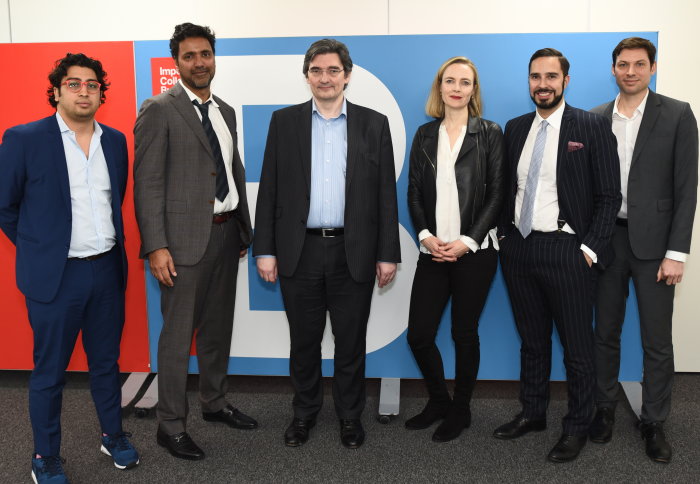Innovation leaders debate future of smart cities

Leaders from innovation and technology debated the future of smart cities at an event hosted last night by the Business School.
The Smart Cities 2018 Town Hall was organised in partnership with Smart Cities New York.

The theme was ‘Citizen-Inspired Innovation’ and brought together experts to discuss how they are redefining urban environments to be smarter, safer and more resilient.
Dr Paolo Taticchi, Director of Global Initiatives at Imperial College Business School, organised the event.
Introducing the event, Dr Taticchi said that “smart cities is a hot topic” for business leaders and explained how Imperial College Business School is well placed to host a debate about sustainability as it has just launched a new elective about smart cities onto its MBA programmes.
The first speaker was Simon Sylvester-Chaudhuri, executive director of Civ:Lab, a non-profit organisation dedicated to scaling solutions for cities globally.
He spoke about how Smart Cities Town Halls began in New York and the impact it was having there.
Smart London

Stephen Lorimer, Smart London Strategy and Delivery Officer at Greater London Authority, then spoke about how the next steps for the Smart London plan.
Imperial’s Professor David Gann, Vice President (Innovation), was influential in working with the previous Mayor of London Boris Johnson to create the first Smart London plan.
Stephen Lorimer explained how they are now taking it forward and were focusing on five key areas:
• City wide collaboration between boroughs
• Public trust in data collection and sharing
• World class connectivity to lower transaction costs
• Accessibility for all Londoners and training in digital skills
• Inclusivity and diversity
Electric Avenue

Imperial’s Professor John Polak, from the Department of Civil and Environmental Engineering, is a member of the Mayor of London’s Smart London board.
Professor Polak explained the origin of smart cities, from the introduction of electric lighting on Electric Avenue in Brixton in the 1890s, to autonomous vehicles transporting people around Greenwich today.
Professor Polak said: “The digital sector can provide integration, which can transform problems such as climate change, water resources and waste management.
“The main thrust of innovation so far has not been about building grand solutions to everything but picking off low hanging fruit in individual sectors.
“And only now are we seeing attempts to realise bigger ambitions. One example where integration is becoming a reality is electric mobility.”
Raj Pannu, from the agency Emergence Creative and a co-founder of Smart Cities New York then spoke about how there is an urgent need for integrating infrastructure with technology as populations increasingly shift to cities.
Data access

The event was closed with a panel debate, chaired by Tom McTague, from Politico.
Panellists included Robyn Scott, from lobbying group Apolitical; Stephen Pattison, from semiconductor and software design company ARM and Simon Sylvester-Chaudhuri.
The panel and audience debated data access, such as how NHS health records could be used to improve treatment in care. The panel said that cities should make more data available, and cited that in access to data in London had led to the creation of apps such as Citymapper.
 The panel also agreed that city Mayors needed to take a long term vision to implementing technology to major projects such as infrastructure.
The panel also agreed that city Mayors needed to take a long term vision to implementing technology to major projects such as infrastructure.
Robyn Scott said: “I’m increasingly of the view that we need laws against data monopolies. We need to bring in more innovators and smaller tech companies to start working with government.”
Article text (excluding photos or graphics) © Imperial College London.
Photos and graphics subject to third party copyright used with permission or © Imperial College London.
Reporter
Stephen Johns
Communications Division
Laura Singleton
Communications Division